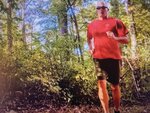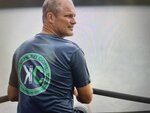

Many watched the other day as a United States crew won its first coxless men’s four gold medal in rowing since 1960, but few can truly appreciate the work it took to end that drought.
Bucks County’s Bob Kaehler happens to be one of those select elite.
The Holland resident, who competed in the USA heavyweight eight boat at the 1992 Barcelona, 1996 Atlanta and 2000 Sydney Olympic Summer Games, knows the effort it takes both on and off the water to compete at the top of the sport.
Kaehler was part of an American squad that won World Championship gold medals on four different occasions in the ’90s.
The Long Island native is the most decorated heavyweight eight rower in United States history.
So when he says the red, white and blue squad earned its country’s first top honor in 64 years through hard – and smart – work, people pay attention.
“U.S. rowing has changed a bit the past six, eight years,” Kaehler explained in a telephone conversation. “They hired a European head coach (Holland’s Josy Verdonkschot), a first, and he seems to have a much better grasp of American culture.”
Also, another USA coach, Mike Teti, who’s been around since the days when Kaehler competed, still has had a hand in this current triumph.
“Mike’s got a ton of experience,” Kaehler pointed out. “It’s less of a centralized coaching system, which is what I rowed through. You had national team training centers, you had to live there. That worked for a little while but around 2004, it slowly changed.
“Now people train with their clubs, like Teti’s in California. This model seems a little more fluid. In 2000, our family had a small child and I had a full-time job. I was exhausted. I strongly considered jumping and just doing a double (two-man boat) to control my life better. So there was that to consider. A centralized system made it a lot harder.”
To this day, lack of funding has something to do with it, too.
“The Brits, for example, the guys make close to a hundred grand a year,” Kaehler said. “We (American rowers) get very little; we have to figure out how to make a living.
“Mike was the one coach who let work (a paid job) be part of your life while you were training. Other coaches said you had to row, you couldn’t work.”
During his competitive years, Kaehler often pulled on his running shoes and hit the roads to build up his aerobic capacity.
He runs the back trails of Tyler State Park in Newtown/Richboro to this day.
“After Atlanta in ’96, I didn’t row for 11 months,” Kaehler said. “All I did was run and cycle. I was so burned out from rowing. I was running Tyler and riding the mountain bike. I didn’t get back on the water again until July of ’97. Only rowed for about six weeks and we won the (World Championship) gold medal.”
If you already have a long resume of rowing experience, it doesn’t hurt to cross-train once in a while.
“You can train hard off the water,” Kaehler said. “We had guys in ’96 where this one coach had us do this ‘triathlon’ ... (part of it was) a 1.8-mile run in Chula Vista, California, with some brutal hills like Tyler and yet the guys were running sub-5-minute miles.”
Running provides a mental (and, in a way, physical) break from constantly knifing oars into long expanses of water.
“For me, personally, I enjoy outdoor stuff period,” Kaehler said. “Whether it’s a trail run; it doesn’t matter to me. In the offseason, we just did other stuff.”
Tyler offers just about the best mixture of hills one can find in terms of local terrain.
“Pretty much most of my training is single track trails in Tyler,” Kaehler said. “Down in Cape May (N.J.) there’s a bird sanctuary where I do off-road. I enjoy that, the connection with nature directly. You’re not running through neighborhoods and that kind of stuff.”
It’s safe to say U.S. Olympic rowers have a long history of being in top shape.
Kaehler knows all about that, having worked for years in physical therapy. He has his own line of personal fitness equipment, including the “Kaehler Core” workout device. He has been working with Ivy Rehab in Warminster.
His family includes wife, Kim, along with daughter Kira and sons Jack and Bill.
Kaehler is a consultant for a number of colleges, high schools and running clubs. His Kaehler Core machines are used by, among others, Harvard, Yale, Columbia, Penn, Brown, Cornell, the University of Washington and M.I.T. Closer to home, the list includes Villa Joseph Marie High School in Holland and the South Jersey Rowing Club.
Schools like these are where some of the Olympic rowers come from. They are breeding grounds that produce the likes of the USA’s recent four-boat gold medalists Liam Corrigan, Michael Grady, Justin Best and Nick Mead.
Back here in Bucks, the 60-year-old Kaehler enjoys helping young athletes – including a growing number of runners – stay fit and stay injury-free.
“I’m spending more time with the running population,” Kaehler said. “Helping runners with their racing or recovering from injury. It’s been fun.”
He can be reached at Robert.Kaehler@Ivyrehab.com for a consultation.
Join our readers whose generous donations are making it possible for you to read our news coverage. Help keep local journalism alive and our community strong. Donate today.